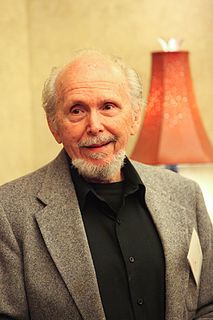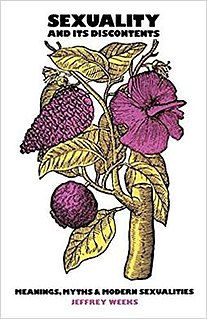Related Research Articles

The Kinsey Reports are two scholarly books on human sexual behavior, Sexual Behavior in the Human Male (1948) and Sexual Behavior in the Human Female (1953), written by Alfred Kinsey, Wardell Pomeroy, Clyde Martin, and Paul Gebhard and published by W.B. Saunders. The two best-selling books were immediately controversial, both within the scientific community and the general public, because they challenged conventional beliefs about sexuality and discussed subjects that had previously been taboo. The validity of Kinsey's methods were also called into question. Kinsey was a zoologist at Indiana University and the founder of the Kinsey Institute for Research in Sex, Gender, and Reproduction.

Sexology is the scientific study of human sexuality, including human sexual interests, behaviors, and functions. The term sexology does not generally refer to the non-scientific study of sexuality, such as social criticism.

Sexual orientation is an enduring pattern of romantic or sexual attraction to persons of the opposite sex or gender, the same sex or gender, or to both sexes or more than one gender. These attractions are generally subsumed under heterosexuality, homosexuality, and bisexuality, while asexuality is sometimes identified as the fourth category.

Alfred Charles Kinsey was an American biologist, professor of entomology and zoology, and sexologist who, in 1947, founded the Institute for Sex Research at Indiana University, now known as the Kinsey Institute for Research in Sex, Gender, and Reproduction. He is best known for writing Sexual Behavior in the Human Male (1948) and Sexual Behavior in the Human Female (1953), also known as the Kinsey Reports, as well as the Kinsey scale. Kinsey's research on human sexuality, foundational to the field of sexology, provoked controversy in the 1940s and 1950s. His work has influenced social and cultural values in the United States as well as internationally.

The Kinsey scale, also called the Heterosexual–Homosexual Rating Scale, is used in research to describe a person's sexual orientation based on one’s experience or response at a given time. The scale typically ranges from 0, meaning exclusively heterosexual, to a 6, meaning exclusively homosexual. In both the male and female volumes of the Kinsey Reports, an additional grade, listed as "X", indicated "no socio-sexual contacts or reactions" (asexuality). The reports were first published in Sexual Behavior in the Human Male (1948) by Alfred Kinsey, Wardell Pomeroy, and others, and were also prominent in the complementary work Sexual Behavior in the Human Female (1953).
Robert Allan Humphreys (1930–1988), known as Laud Humphreys, was an American sociologist and Episcopal priest. He is noted for his research into sexual encounters between men in public bathrooms, published as Tearoom Trade (1970) and for the questions that emerged from what many believe to be unethical research methods. He influenced generations of scholars who research issues related to sexuality and sexual identity.
Labeling theory posits that self-identity and the behavior of individuals may be determined or influenced by the terms used to describe or classify them. It is associated with the concepts of self-fulfilling prophecy and stereotyping. Labeling theory holds that deviance is not inherent in an act, but instead focuses on the tendency of majorities to negatively label minorities or those seen as deviant from standard cultural norms. The theory was prominent during the 1960s and 1970s, and some modified versions of the theory have developed and are still currently popular. Stigma is defined as a powerfully negative label that changes a person's self-concept and social identity.
Sexual attraction to transgender people has been the subject of scientific study and social commentary. Psychologists have researched sexual attraction toward trans women, cross dressers, non-binary people, and a combination of these. Cisgender men attracted to transgender women primarily identify as heterosexual and sometimes as bisexual, but rarely as homosexual. Sexual arousal research has confirmed that their response patterns are unlike those of gay men and resemble those of heterosexual men, except that they are highly aroused by transgender women in addition to cisgender women. They show little arousal to men. There has been some discussion of attraction to trans men, but it has not yet been the topic of scientific study.
John H. Gagnon was a pioneering sociologist of human sexuality who wrote and edited 15 books and over 100 articles. His key work is Sexual Conduct: The Social Sources of Human Sexuality (1973), which he co-authored with William Simon. He was Distinguished Emeritus Professor of Sociology at the State University of New York at Stony Brook where he taught and researched from 1968 to 1998.
Gisela Bleibtreu-Ehrenberg is a German sociologist, ethnologist, sexologist, and writer further specializing into the fields of psychology, Indo-European studies, religious studies, and philosophy, since 1980 also increasingly anthropology. As Bleibtreu-Ehrenberg uses these approaches in research particularly in the fields of sexology, homophobia, and prejudice studies, the US Society of Lesbian and Gay Anthropologists of the American Anthropological Association ranked Bleibtreu-Ehrenberg's works on homophobia as internationally outstanding.

Bisexuality is romantic attraction, sexual attraction, or sexual behavior toward both males and females, or to more than one gender. It may also be defined to include romantic or sexual attraction to people regardless of their sex or gender identity, which is also known as pansexuality.

Ira Leonard Reiss is a sociologist with primary interests in studying the way society impacts sexual attitudes and behaviors and how people respond to those pressures. He also has interests in the study of gender and family, particularly as they relate to sexuality. He attended Syracuse University for his B.S. degree and the Pennsylvania State University for his M. A. and Ph. D. degrees. His major area in graduate school was sociology and his minor areas were cultural anthropology and philosophy. His doctoral course work in sociology and philosophy was done at Columbia University and his French and German language study was taken at Yale University.
Frederick Lee "Fred" Whitam was an American sociologist who studied homosexuality from a cross-cultural perspective. Scholar Paul Vasey described Whitam as "an essentialist during a time of rampant social constructionism."

Sexual Preference: Its Development in Men and Women (1981) is a book about the development of sexual orientation by the psychologist Alan P. Bell and the sociologists Martin S. Weinberg and Sue Kiefer Hammersmith, in which the authors reevaluate what were at the time of its publication widely held ideas about the origins of heterosexuality and homosexuality, sometimes rejecting entirely the factors proposed as causes, and in other cases concluding that their importance had been exaggerated. Produced with the help of the American National Institute of Mental Health, the study was a publication of the Institute for Sex Research. Together with its Statistical Appendix, Sexual Preference was the conclusion of a series of books including Homosexuality: An Annotated Bibliography (1972) and Homosexualities: A Study of Diversity Among Men and Women (1978), both co-authored by Bell and Weinberg.

Homosexualities: A Study of Diversity Among Men and Women (1978) is a book by the psychologist Alan P. Bell and the sociologist Martin S. Weinberg in which the authors argue that homosexuality is not necessarily related to pathology and divide homosexuals into five types. Together with Homosexuality: An Annotated Bibliography (1972), it is part of a series of books that culminated in the publication of Sexual Preference in 1981. The work was a publication of the Institute for Sex Research.
Colin J. Williams is a sociologist and retired Professor of Sociology at Indiana University-Purdue University at Indianapolis. He served as Research Sociologist at the Kinsey Institute for Sex Research from 1968-1980. Williams' work frequently looks at sociological issues affecting gay, lesbian, bisexual and transgender people.
William Simon (1930–2000) was a sociologist of human sexualities between 1970 and 2000. His co-authored book, Sexual Conduct: The Social Sources of Human Conduct played a major role in shaping the contemporary sociology of sexuality and critical sexualities studies. His work helped pioneer a theory of sexual scripting and he was a gentle but radical advocate of sexual tolerance. He was an early advocate of gay rights and testified against obscenity laws.
Edward Otto Laumann is an American sociologist. He is the George Herbert Mead Distinguished Service Professor in the Department of Sociology at the University of Chicago. Laumann earned his Ph.D. in the Harvard Department of Social Relations in 1964, where he studied under George Homans, Talcott Parsons, and Harrison White. He has written extensively on social stratification, urban sociology, organizational sociology, health and aging, and is widely recognized as a pioneer in the areas of social network analysis and the sociology of sexuality. In 2013, he was elected to the American Academy of Arts and Sciences.

Sexuality and Its Discontents: Meanings, Myths, and Modern Sexualities is a 1985 book about the politics and philosophy of sex by the sociologist Jeffrey Weeks. The book received positive reviews, crediting Weeks with explaining the theories of sexologists and usefully discussing controversial sexual issues. However, Weeks was criticised for his treatment of feminism and sado-masochism.

Mary Susan McIntosh was a British sociologist, feminist, political activist and campaigner for lesbian and gay rights in the UK.
References
- ↑ Brody, Jane E. (August 23, 1981). Kinsey study finds homosexuals show early predisposition. New York Times
- ↑ Buckley, Tom (April 20, 1969). All they talk about is sex, sex, sex. New York Times